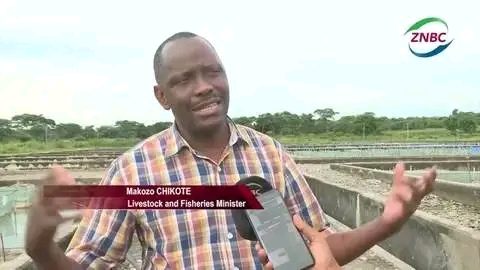CTPD urges Government to strengthen forward and backward linkages between agriculture and manufacturing sectors in Zambia
Notice: Undefined index: catFilterList in /home/zambi/public_html/wp-content/plugins/wp-likes/api.php on line 243

Technology Science Minister Felix Chipota Mutati
By Saeed Simon Banda, Henry Chunza and Derrick Sinjela in Lusaka, Zambia www.ctpd.org.zm
CENTRE for Trade Policy and Development (CTPD) Trade and Development Researcher Emmanuel Muma urging the United Party for National Development (UPND) Administration through Agriculture Minister Reuben Mtolo Phiri and Technology and Science Minister Felix Chipota Mutati to develop strong forward and backward linkages between agriculture and manufacturing sectors in Zambia.
Mr. Muma implored Mr. Phiri and Mr. Mutati to ensure that policies are anchored on promoting evolution of technology to aid and enhance the agriculture sector with proven production technologies and supportive policies in agriculture and manufacturing sectors.

CTPD Information and Communications Specialist Mwaka Nyimbili
In a Tuesday, 16th August, 2022 Press Statement, CTPD Information and Communications Specialist Mwaka Nyimbili, Muma insisted that Technology in farming can help to accelerate growth by ensuring higher crop yields, promoting climate smart agriculture practices, and enhancing farming sustainability.
Said Muma: “Technology is also key in promoting industrial development and innovations for value addition as well as offering efficient means towards reducing post-harvest losses among small- scale farmers. CTPD is saddened to note that small-scale producers are still facing market challenges for their produce across the supply chain”.

Agriculture Minister Reuben Mtolo Phiri
A worried Muma cautioned Zambia National Farmers Union (ZNFU) to realise that instead of condemning local producers and calling them to refrain from dumping several vegetables on the local market, it is imperative to first address market challenges and the low uptake and demand for local agriculture produce in the manufacturing industry.
“CTPD notes that most locally produced goods still face limited access to organized markets such as chain stores and the challenge is worsened by weak forward and backward linkages between agriculture and manufacturing sectors in Zambia. In addition, Non-Tariff Barriers to Trade (NTBs) such as cumbersome trade procedures, Sanitary and Phytosanitary Measures (SPS), and Export Permit Certification costs, most often denies small scale producers easy access to regional and international export markets,” advised Muma.

Zambian Children Young People and Women in Development (ZCYPWD)
The (CTPD) Trade and Development Researcher urged the Government to consider implementing three recommendations in order to strengthen forward and backward linkages between agriculture and manufacturing sectors in Zambia.
“First, Government needs to put more efforts towards enforcement and implementation of the Local Content Strategy to address locally produced goods demand constraints. Excess supply of goods leading to post-harvest losses can be a reflection of the challenges of low demand for final products between sectors and low uptake of food supplies by local markets such as Chain Stores; secondly, there is need for Government to promote productive and innovative capabilities for local firms to produce some of the imported inputs. Trade data stills shows that a number of Agro processing firms in Zambia rely on imports of intermediate agricultural and non-agricultural
inputs, mainly from South Africa, which is a clear indication that there are opportunities to strengthen the linkages in the local economy even further and thirdly, in light of challenges to market access, there is need for government to holistically unlock regional markets with competitively produced exports goods”.

CTPD’s Trade and Development Researcher Emmanuel Muma
Policy support can be focused at identifying value chains where Zambia exhibits a clear comparative advantage in the region. However, for this strategy to be successful, it is important for Zambia to address logistical constraints like infrastructure, streamlining export and import processes and providing direct and indirect incentives for local firms to become competitive.
The Centre for Trade Policy and Development (CTPD) is a not- for –profit, membership based trade policy and development think tank established in 1999, and existed as the civil society trade network (CSTNZ), until 2009 when it rebranded as the CTPD.
The mandate of CTPD is to influence pro-poor trade and investment reforms at national, regional and multilateral levels as well as facilitate the participation of various stakeholders including member organizations in ensuring that trade is used as a tool for poverty eradication.

Avocado 🥑 Growers Association of Zambia President Engineer Bernard Chiwala

Avocado 🥑 Growers Association of Zambia President Engineer Bernard Chiwala





















